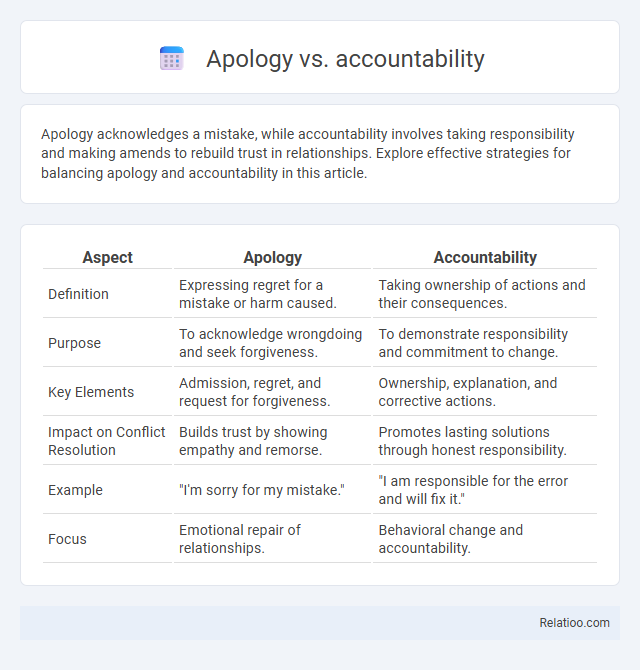Apology acknowledges a mistake, while accountability involves taking responsibility and making amends to rebuild trust in relationships. Explore effective strategies for balancing apology and accountability in this article.
Table of Comparison
| Aspect | Apology | Accountability |
|---|---|---|
| Definition | Expressing regret for a mistake or harm caused. | Taking ownership of actions and their consequences. |
| Purpose | To acknowledge wrongdoing and seek forgiveness. | To demonstrate responsibility and commitment to change. |
| Key Elements | Admission, regret, and request for forgiveness. | Ownership, explanation, and corrective actions. |
| Impact on Conflict Resolution | Builds trust by showing empathy and remorse. | Promotes lasting solutions through honest responsibility. |
| Example | "I'm sorry for my mistake." | "I am responsible for the error and will fix it." |
| Focus | Emotional repair of relationships. | Behavioral change and accountability. |
Understanding Apology vs Accountability
Understanding apology versus accountability involves recognizing that an apology is a verbal acknowledgment of wrongdoing, while accountability requires taking responsibility through actions that address the consequences and prevent recurrence. An effective apology conveys empathy and remorse, but without accountability, trust and credibility cannot be fully restored. Organizations and individuals must integrate both apology and accountability to foster genuine reconciliation and long-term relationship repair.
Definitions: What Is an Apology?
An apology is a verbal or written expression acknowledging wrongdoing or harm caused, demonstrating remorse and responsibility for one's actions. It serves as the first step toward accountability by openly admitting fault without excuses or deflections. Unlike accountability or reconciliation, an apology specifically addresses the emotional impact on the offended party, aiming to restore trust and initiate healing.
Defining Accountability in Relationships
Accountability in relationships means taking responsibility for your actions and their impact on others, which builds trust and mutual respect. It involves acknowledging mistakes honestly and committing to change without defensiveness, fostering a safe space for open communication. Your willingness to be accountable strengthens connection and lays the groundwork for genuine reconciliation after conflicts.
Key Differences Between Apology and Accountability
An apology involves expressing regret for a mistake or wrongdoing, often aimed at acknowledging harm and seeking forgiveness, while accountability requires taking responsibility for actions and making tangible efforts to rectify the consequences. Your ability to demonstrate accountability extends beyond words, involving transparent actions, corrective measures, and ongoing commitment to change. Understanding these distinctions is crucial for effective reconciliation, where both sincere apology and genuine accountability interact to restore trust and heal relationships.
Why Apologies Without Accountability Fall Short
Apologies without accountability often fail to restore trust because they lack genuine responsibility for the harm caused, leaving Your actions disconnected from your words. Accountability demonstrates a commitment to making amends and preventing future harm, which is essential for meaningful reconciliation. Without it, apologies can seem insincere, hindering emotional healing and the rebuilding of relationships.
The Psychology Behind Genuine Accountability
Genuine accountability in psychology involves an honest acknowledgment of harm caused and an active commitment to change, which fosters trust and emotional healing. Unlike a simple apology, true accountability requires you to understand the impact of your actions on others and take responsibility without deflecting blame. This process is fundamental for reconciliation, as it helps repair relationships by promoting empathy, trust-building, and collaborative problem-solving.
Steps to Move from Apology to Accountability
Moving from apology to accountability involves acknowledging the harm caused, taking responsibility without deflecting blame, and committing to concrete actions that address the underlying issues. Implementing transparent measures such as restitution, policy changes, or behavior modification plans validates the apology and fosters trust. Continuous evaluation and open communication ensure that the steps toward accountability are maintained, paving the way for genuine reconciliation.
How Accountability Builds Trust
Accountability establishes a foundation of trust by demonstrating Your commitment to taking responsibility for actions and their consequences. Unlike a simple apology, accountability involves concrete steps to address harm and prevent recurrence, signaling reliability and integrity. This practice fosters deeper reconciliation by showing genuine respect and willingness to repair relationships through transparent and consistent behavior.
Common Pitfalls: Mistaking Apology for Accountability
Mistaking apology for accountability occurs when individuals or organizations issue insincere or incomplete apologies without taking meaningful actions to address harm, undermining trust restoration. Common pitfalls include offering vague or defensive apologies, avoiding responsibility, and neglecting to implement corrective measures, which impede genuine reconciliation efforts. True accountability requires transparent acknowledgment of wrongdoing, tangible reparations, and sustained commitment to prevent recurrence, distinguishing it fundamentally from mere verbal expressions of regret.
Cultivating Accountability in Everyday Life
Cultivating accountability in everyday life requires embracing the responsibility for your actions instead of merely offering apologies, which can sometimes be superficial. Accountability involves recognizing the impact of your behavior, making genuine efforts to correct mistakes, and fostering trust through consistent, transparent communication. Reconciliation follows as a meaningful process that restores relationships once accountability has been firmly established, creating a foundation for genuine healing and growth.

Infographic: Apology vs Accountability
 relatioo.com
relatioo.com